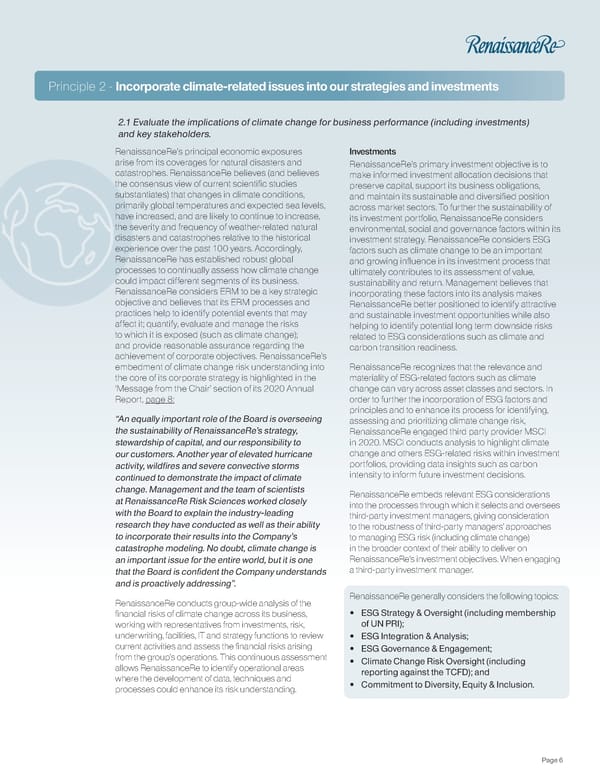Principle 2 - Incorporate climate-related issues into our strategies and investments 2.1 Evaluate the implications of climate change for business performance (including investments) and key stakeholders. RenaissanceRe’s principal economic exposures Investments arise from its coverages for natural disasters and RenaissanceRe’s primary investment objective is to catastrophes. RenaissanceRe believes (and believes make informed investment allocation decisions that the consensus view of current scientific studies preserve capital, support its business obligations, substantiates) that changes in climate conditions, and maintain its sustainable and diversified position primarily global temperatures and expected sea levels, across market sectors. To further the sustainability of have increased, and are likely to continue to increase, its investment portfolio, RenaissanceRe considers the severity and frequency of weather-related natural environmental, social and governance factors within its disasters and catastrophes relative to the historical investment strategy. RenaissanceRe considers ESG experience over the past 100 years. Accordingly, factors such as climate change to be an important RenaissanceRe has established robust global and growing influence in its investment process that processes to continually assess how climate change ultimately contributes to its assessment of value, could impact different segments of its business. sustainability and return. Management believes that RenaissanceRe considers ERM to be a key strategic incorporating these factors into its analysis makes objective and believes that its ERM processes and RenaissanceRe better positioned to identify attractive practices help to identify potential events that may and sustainable investment opportunities while also affect it; quantify, evaluate and manage the risks helping to identify potential long term downside risks to which it is exposed (such as climate change); related to ESG considerations such as climate and and provide reasonable assurance regarding the carbon transition readiness. achievement of corporate objectives. RenaissanceRe’s embedment of climate change risk understanding into RenaissanceRe recognizes that the relevance and the core of its corporate strategy is highlighted in the materiality of ESG-related factors such as climate ‘Message from the Chair’ section of its 2020 Annual change can vary across asset classes and sectors. In Report, page 8: order to further the incorporation of ESG factors and principles and to enhance its process for identifying, “An equally important role of the Board is overseeing assessing and prioritizing climate change risk, the sustainability of RenaissanceRe’s strategy, RenaissanceRe engaged third party provider MSCI stewardship of capital, and our responsibility to in 2020. MSCI conducts analysis to highlight climate our customers. Another year of elevated hurricane change and others ESG-related risks within investment activity, wildfires and severe convective storms portfolios, providing data insights such as carbon continued to demonstrate the impact of climate intensity to inform future investment decisions. change. Management and the team of scientists RenaissanceRe embeds relevant ESG considerations at RenaissanceRe Risk Sciences worked closely into the processes through which it selects and oversees with the Board to explain the industry-leading third-party investment managers, giving consideration research they have conducted as well as their ability to the robustness of third-party managers’ approaches to incorporate their results into the Company’s to managing ESG risk (including climate change) catastrophe modeling. No doubt, climate change is in the broader context of their ability to deliver on an important issue for the entire world, but it is one RenaissanceRe’s investment objectives. When engaging that the Board is confident the Company understands a third-party investment manager. and is proactively addressing”. RenaissanceRe conducts group-wide analysis of the RenaissanceRe generally considers the following topics: financial risks of climate change across its business, • ESG Strategy & Oversight (including membership working with representatives from investments, risk, of UN PRI); underwriting, facilities, IT and strategy functions to review • ESG Integration & Analysis; current activities and assess the financial risks arising • ESG Governance & Engagement; from the group’s operations. This continuous assessment • Climate Change Risk Oversight (including allows RenaissanceRe to identify operational areas reporting against the TCFD); and where the development of data, techniques and • Commitment to Diversity, Equity & Inclusion. processes could enhance its risk understanding. Page 6
 2022 ClimateWise Report Page 7 Page 9
2022 ClimateWise Report Page 7 Page 9